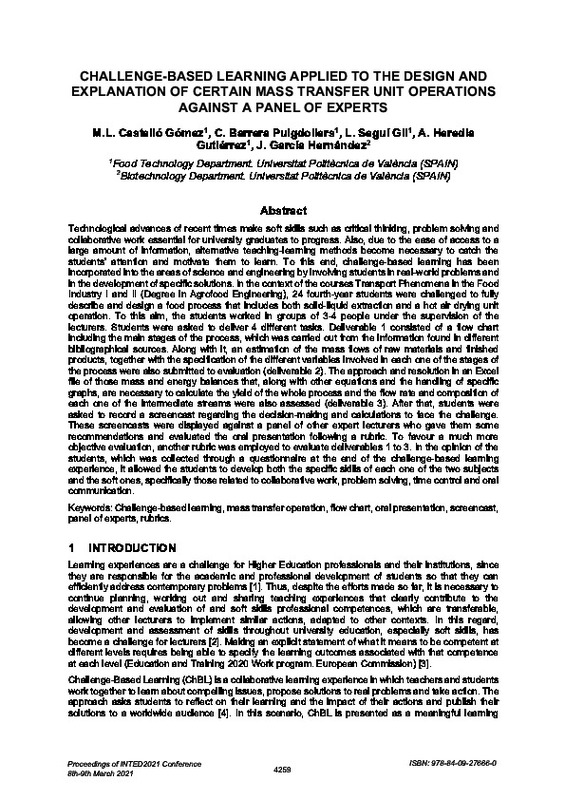JavaScript is disabled for your browser. Some features of this site may not work without it.
Buscar en RiuNet
Listar
Mi cuenta
Estadísticas
Ayuda RiuNet
Admin. UPV
Challenge-based learning applied to the design and explanation of certain mass transfer unit operations against a panel of experts
Mostrar el registro sencillo del ítem
Ficheros en el ítem
| dc.contributor.author | Castelló Gómez, María Luisa
|
es_ES |
| dc.contributor.author | Barrera Puigdollers, Cristina
|
es_ES |
| dc.contributor.author | Seguí Gil, Lucía
|
es_ES |
| dc.contributor.author | Heredia Gutiérrez, Ana Belén
|
es_ES |
| dc.contributor.author | García Hernández, Jorge
|
es_ES |
| dc.date.accessioned | 2022-03-02T08:19:32Z | |
| dc.date.available | 2022-03-02T08:19:32Z | |
| dc.date.issued | 2021-03-09 | es_ES |
| dc.identifier.isbn | 978-84-09-27666-0 | es_ES |
| dc.identifier.issn | 2340-1079 | es_ES |
| dc.identifier.uri | http://hdl.handle.net/10251/181192 | |
| dc.description.abstract | [EN] Technological advances of recent times make soft skills such as critical thinking, problem solving and collaborative work essential for university graduates to progress. Also, due to the ease of access to a large amount of information, alternative teaching-learning methods become necessary to catch the students¿ attention and motivate them to learn. To this end, challenge-based learning has been incorporated into the areas of science and engineering by involving students in real-world problems and in the development of specific solutions. In the context of the courses Transport Phenomena in the Food Industry I and II (Degree in Agrofood Engineering), 24 fourth-year students were challenged to fully describe and design a food process that includes both solid-liquid extraction and a hot air drying unit operation. To this aim, the students worked in groups of 3-4 people under the supervision of the lecturers. Students were asked to deliver 4 different tasks. Deliverable 1 consisted of a flow chart including the main stages of the process, which was carried out from the information found in different bibliographical sources. Along with it, an estimation of the mass flows of raw materials and finished products, together with the specification of the different variables involved in each one of the stages of the process were also submitted to evaluation (deliverable 2). The approach and resolution in an Excel file of those mass and energy balances that, along with other equations and the handling of specific graphs, are necessary to calculate the yield of the whole process and the flow rate and composition of each one of the intermediate streams were also assessed (deliverable 3). After that, students were asked to record a screencast regarding the decision-making and calculations to face the challenge. These screencasts were displayed against a panel of other expert lecturers who gave them some recommendations and evaluated the oral presentation following a rubric. To favour a much more objective evaluation, another rubric was employed to evaluate deliverables 1 to 3. In the opinion of the students, which was collected through a questionnaire at the end of the challenge-based learning experience, it allowed the students to develop both the specific skills of each one of the two subjects and the soft ones, specifically those related to collaborative work, problem solving, time control and oral communication. | es_ES |
| dc.description.sponsorship | The authors thank UPV for the financul support given with the project PIME/20-21/208 entitled: "Aprendizaje basado en retos: una contribución a la adquisición significativa de competencias profesionales (transversales y específicas) del ámbito agroalimentario y biotecnológico". | es_ES |
| dc.language | Inglés | es_ES |
| dc.publisher | IATED Academy | es_ES |
| dc.relation.ispartof | INTED2021 Proceedings | es_ES |
| dc.rights | Reserva de todos los derechos | es_ES |
| dc.subject | Challenge-based learning | es_ES |
| dc.subject | Expert panel | es_ES |
| dc.subject | Rubrics | es_ES |
| dc.subject | Mass transfer unit operations | es_ES |
| dc.subject | Screencast | es_ES |
| dc.subject | Flow chart | es_ES |
| dc.subject | Oral presentations | es_ES |
| dc.subject.classification | TECNOLOGIA DE ALIMENTOS | es_ES |
| dc.subject.classification | MICROBIOLOGIA | es_ES |
| dc.title | Challenge-based learning applied to the design and explanation of certain mass transfer unit operations against a panel of experts | es_ES |
| dc.type | Comunicación en congreso | es_ES |
| dc.type | Artículo | es_ES |
| dc.type | Capítulo de libro | es_ES |
| dc.identifier.doi | 10.21125/inted.2021.0868 | es_ES |
| dc.relation.projectID | info:eu-repo/grantAgreement/ICE-UPV//PIME%2F20-21%2F208//Aprendizaje Basado en Retos: una contribución a la adquisición significativa de competencias profesionales (transversales y específicas) del ámbito agroalimentario y biotecnológico/ | es_ES |
| dc.rights.accessRights | Abierto | es_ES |
| dc.contributor.affiliation | Universitat Politècnica de València. Departamento de Biotecnología - Departament de Biotecnologia | es_ES |
| dc.contributor.affiliation | Universitat Politècnica de València. Departamento de Tecnología de Alimentos - Departament de Tecnologia d'Aliments | es_ES |
| dc.description.bibliographicCitation | Castelló Gómez, ML.; Barrera Puigdollers, C.; Seguí Gil, L.; Heredia Gutiérrez, AB.; García Hernández, J. (2021). Challenge-based learning applied to the design and explanation of certain mass transfer unit operations against a panel of experts. IATED Academy. 4259-4267. https://doi.org/10.21125/inted.2021.0868 | es_ES |
| dc.description.accrualMethod | S | es_ES |
| dc.relation.conferencename | 15th International Technology, Education and Development Conference (INTED 2021) | es_ES |
| dc.relation.conferencedate | Marzo 08-09,2021 | es_ES |
| dc.relation.conferenceplace | Online | es_ES |
| dc.relation.publisherversion | https://doi.org/10.21125/inted.2021.0868 | es_ES |
| dc.description.upvformatpinicio | 4259 | es_ES |
| dc.description.upvformatpfin | 4267 | es_ES |
| dc.type.version | info:eu-repo/semantics/publishedVersion | es_ES |
| dc.relation.pasarela | S\430901 | es_ES |
| dc.contributor.funder | Instituto de Ciencias de la Educación, Universitat Politècnica de València | es_ES |








